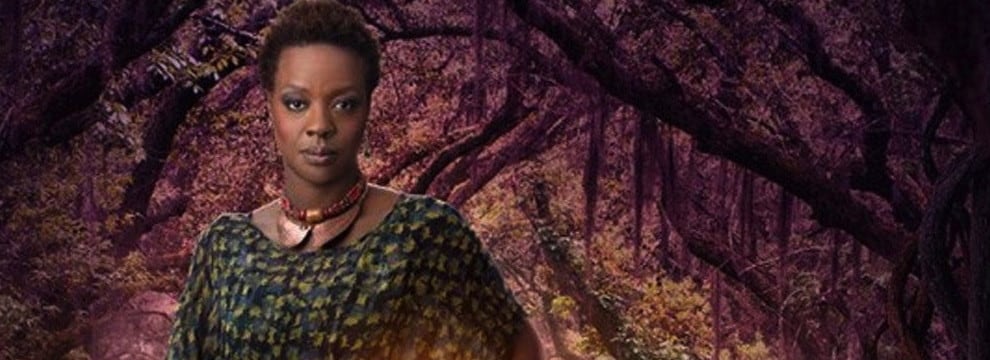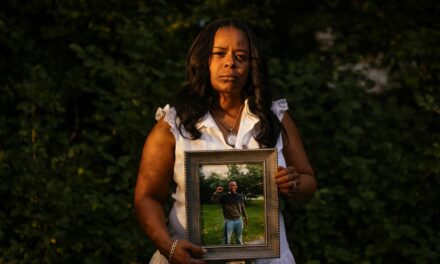The rich, earthy voice is familiar to millions who have seen her movies. Chatting about her work on a fall afternoon, Viola Davis is warm, friendly, and in no way a diva. But as I listen to her, what I find most striking is the passion, the seriousness that comes through when the topic turns not just to her work, but also her mission to make a difference in theatre and in Hollywood.
The Julliard-educated actress appears more petite in person than on film. She has striking, deep chocolate skin and finely defined cheekbones, but perhaps one of her best features is her elegant Afro. Though, we seldom see it, considering that her profession and the expectations of Hollywood require her to hide her natural style under wigs, such as one of her current roles as Major Gwen Anderson in the science-fiction film Ender’s Game.
Altered appearance aside, Viola brilliantly portrays a military psychologist who is the moral center of the film, a role that reflects how most moviegoers have come to see her, though it’s not necessarily how she sees herself. She breaks into a slightly self-conscious laugh as she admits, “Ever since Doubt, when people see heroic characters, for some reason, they think of me.”
Yet hero is a very appropriate word for someone who is choosing the path Viola has taken — not just to benefit herself, but also her fellow black actors. Still, Viola does not see herself as unique or special in any way. The other quality that one cannot help but notice is her humility.
“Viola taught me about humility,” says actress Edwina Finley, who portrays Davina Lambreaux in HBO’s Emmy-nominated series Tremé and who counts Davis as a mentor. “She also teaches me that life is more than the industry.”
“With each success,” Finley explains, “Viola is always about ‘OK, how is this gonna bless other people? How can I use this to bless, inspire, encourage, build us as a people?’ One thing that she gives away, that she carries, is she focuses on the work, first and foremost, not on the publicity, not on autographs. Not on the red carpets. She focuses on the work and lets the rest of it follow.”
I witnessed it firsthand, back in 2009 at a dinner party in the Hollywood Hills that Alfre Woodard threw for Viola and Taraji P. Henson, who were both up for Academy Awards. Viola, politely accepted her kudos from actresses like Regina King, Loretta Devine and Halle Berry, but maintained this quiet humble spirit we’ve come to see from her on the red carpet.
She’s gracious, naturally, and accepting of the goodwill anyone wishes her. But she understands that while there’s been a shift — as she calls it — there’s still work to do
A New Force in Hollywood
Though Viola ultimately didn’t walk away with the Academy Award on Oscar night in 2009, or last year for her work in The Help, she walked away with something else.
For many black women, her appearance on the red carpet in a gorgeous emerald gown and short Afro was one of the most memorable moments of the night. By refusing to cover her natural hair, she sparked a conversation about the dynamics and the diversity of beauty.
Viola told me that women of her hue aren’t always considered beautiful, which in part influenced her decision to take off the wig.
“I needed to step into who I was,” she explained. “I felt like that was the best time to do it, because I felt a shift in my career and I felt that this next stage in my life and my career didn’t need to be approached with timidity — that it needed to be approached with boldness.”
As part of this next stage, the 48-year-old and her husband, actor-filmmaker Julius Tennon, adopted a newborn girl in 2011 after nearly a decade of marriage. They also joined forces, and their first names, to start JuVee Productions. Through this company, Viola is using her power and sense of responsibility to do something about the images of ourselves that we, and especially her daughter, Genesis, will see on screen.
JuVee projects range from the story of black-owned Vee-Jay Records, which held rights to early Beatles hits and signed acts like The Dells and John Lee Hooker, to a biopic based on the book Barbara Jordan: American Hero in which Viola will star as the legendary congresswoman from Houston.
Setting and Redefining a Standard
Viola is currently busy with another biopic on James Brown, produced by Imagine Entertainment. In Get on Up, due out next fall, she portrays Susie Brown, who gave birth to the Godfather of Soul. To play Susie, Viola has reportedly even subjected herself to Hugh Jackman’s Wolverine diet to drop a few pounds.
She’ll also appear in Cyber, a film about high-level computer hacking. An experienced thespian on stage, she will reprise her 2010 Tony Award-winning role as Rose Maxson in the film adaptation of August Wilson’s play Fences, which will be directed by her co-star on Broadway, Denzel Washington. In 2002, Washington also directed her virtually silent, but powerful role as the missing mother in Antwone Fisher.
Viola is talented, to be sure, but she is also beautiful. Still, all the talk about beauty took her by surprise. Beauty and Viola are words that were rarely used in the same sentence while she was growing up in Central Falls, R.I., where her family relocated from her grandmother’s farm in St. Matthews, S.C., shortly after her birth in 1965. However, she has learned to own it and transcend it, embodying the old saying, “beauty is as beauty does.”
“She has taken an opportunity not just to set a standard, but to redefine it,” Cicely Tyson said in her vignette of Viola for Time Magazine’s cover story on “The World’s 100 Most Influential People.”
“This acknowledgment speaks to the richness of her soul and how she has carried out her life as a mother, wife and actress,” Tyson added. “She affords me great hope for the future.”
Committed to Making a Difference
Now, in addition to captivating grace, and incredible talent, Viola has power – something rare for a black woman in Hollywood. She is putting that power to work to tell our stories. In the process, projects like the Barbara Jordan biopic will once again surely attach her name to Hollywood’s biggest prize. Yet, even in the face of gaining a type of green-light access that many actresses simply don’t have, Viola remains focused on the future, her culture and her peers, not herself.
“I see the responsibility,” she says. “I see the access and now the power I have to somehow play my part in changing how we’re perceived in Hollywood and in narratives.”
“I can’t allow myself to bask in glory too much, because I think that’ll stop me,” Viola adds. “It’ll just mean that I’m just kind of working for myself and right now you’ve gotta put something out there, because there’s so many young actors of color coming up and there’s not enough narratives out there that will sustain them throughout a career, and even start a career for them.”
“We need to create more,” she insists. “There needs to be more work out there for us to cover. So then, Kimberly Elise, Alfre Woodard or CCH Pounder or any number of actors out there — Octavia Spencer, Aunjanue Ellis — they don’t have to sit out, that there’s enough for all of us to shine.”
Her commitment to make a difference is exactly why Viola does shine — whether she’s in front of the camera, behind the camera or redefining the American concept of beauty by strolling the red carpet coiffed in a short Afro on Oscar night.
Yet even when she speaks of that night, she admits she was a reluctant hero.
“I didn’t know if that was the night to make the statement. And then I thought, ‘What other night would be the perfect night to make the statement, because more people are watching this than would be watching me leave a hotel in New York City with my wig off?’ And so I’m glad that I did it. It was a proud moment for me, too.”
As well it should have been.
Kelley L. Carter is an Emmy-award winning entertainment journalist, who has written for publications including the Detroit Free Press, Vibe magazine, USA Today and the Chicago Tribune.








